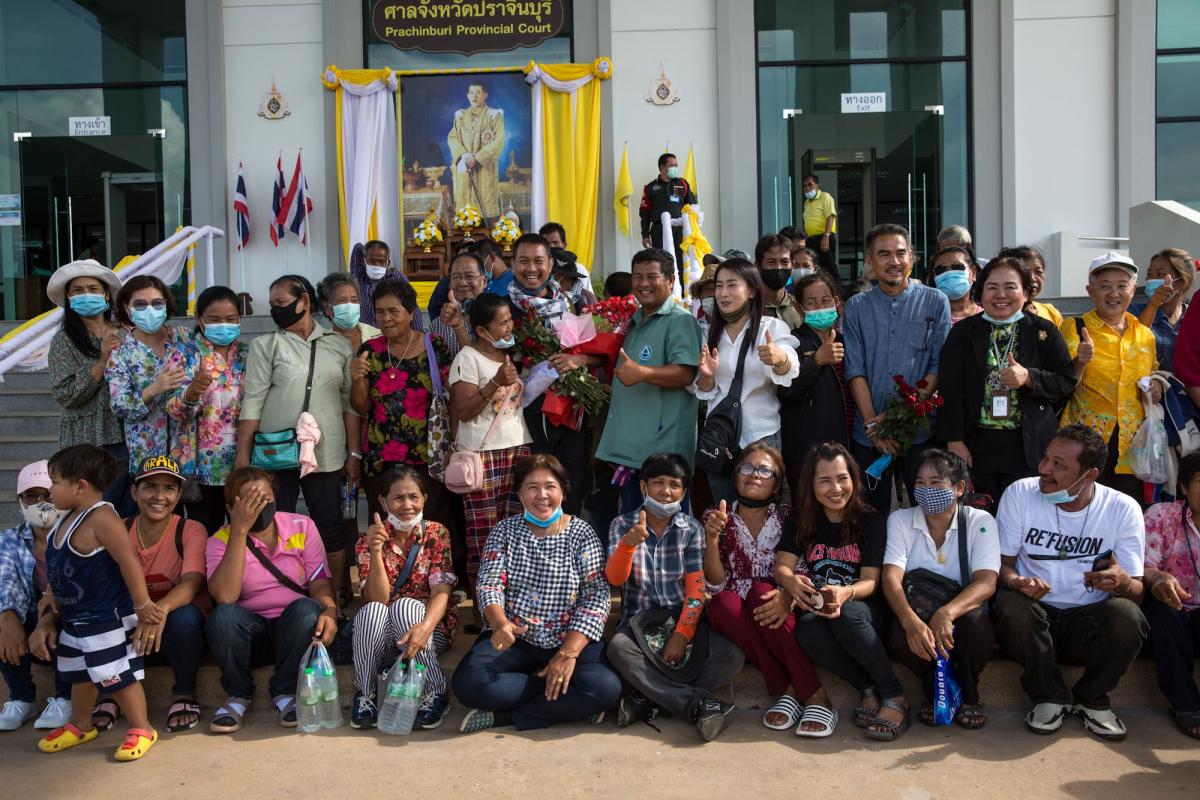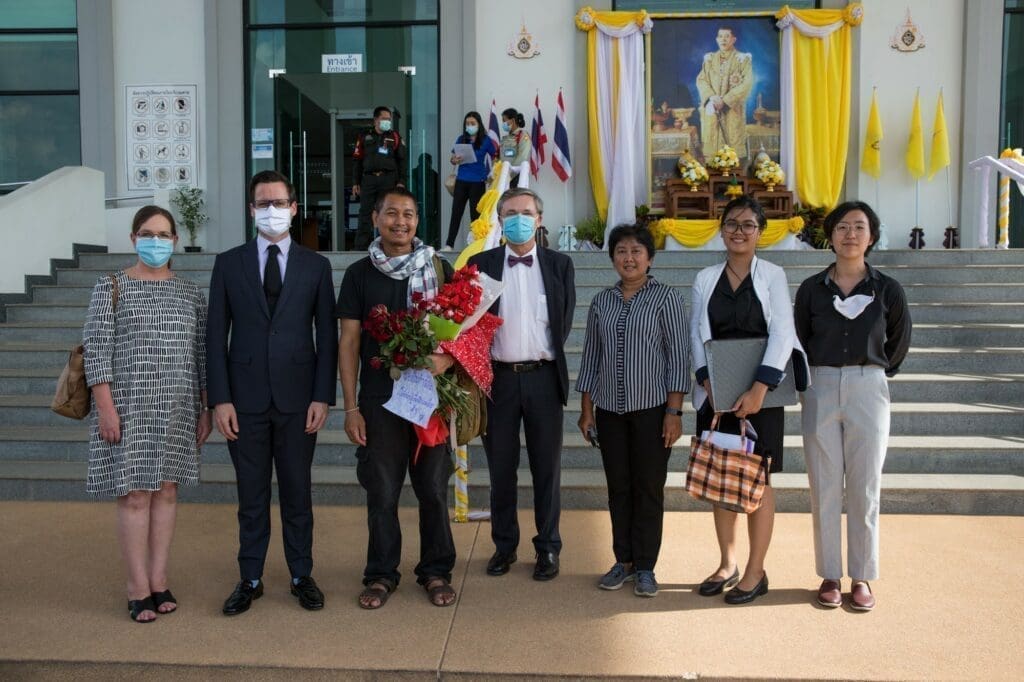Update on W/HRD Trial Observation: Industrial Waste Management Company to Withdraw SLAPP Lawsuit against Environmental W/HRD Sumeth Rainpongnam as Public Pressure Mounts
4 September 2020 [Bangkok] – Following the case’s preliminary hearing, the SLAPP lawsuit filed by an industrial waste management company against the environmental W/HRD, Sumeth Rainpongnam, will likely be dropped. After two failed mediation attempts and the judge signaling that he may dismiss the case based on its nature of being a “public interest issue”, the company’s proposal of accusations and demands has been significantly toned down. The company is most likely to withdraw the case under the condition that the environmental community group Khon Rak Krok Somboon, remove one of their “toxic waste” banners that is currently hung in one of the communities.
The preliminary hearing took place on 31 August 2020 at the Prachin Buri Provincial Court, with diplomats from the Embassy of Finland, the Embassy of New Zealand, and the Embassy of Germany observing the trial. The EnLAW Foundation, members of the media, and various community groups were also present to demonstrate their solidarity and support for Rainpongnam and his family.
This preliminary hearing arose after two failed mediation attempts on 8 July and 11 August. The hearing was to determine whether or not there was sufficient evidence for the trial against the defendant to continue. However, the judge then attempted a third mediation, which resulted in an agreement by both sides. The plaintiff was represented by Warayut Laorphanpol, one of the company’s board members.
After over two hours of mediation, the company proposed that the banner with the word “toxic waste” be taken down within three days, then the company would withdraw both of the defamation cases against Rainpongnam—one which was filed at the Prachin Buri Provincial Court and another at the Bangkok Criminal Court.
The defendant agreed to take down the banner within three days, while the company’s representative stated that he would need to consult the agreement with his board members. The next hearing at the Prachin Buri Provincial Court is scheduled for 30 September 2020, which will either finalize the official withdrawal of the case or conduct another preliminary hearing, if mediation conditions are not met.
The preliminary hearing for the second defamation case, which is fixed for 14 September at the Bangkok Criminal Court, is also most likely to be postponed, pending the outcome of the first case at the Prachin Buri Provincial Court.
Rainpongnam said that he was quite satisfied with the outcome, saying that the struggles of his community have made it worth it. “I am so thankful for the overwhelming support from those outside the court, which is very powerful and has made it possible for this to happen,” said Rainpongnam, “I explained to the judge that my mother and father have been sick, and they have to breathe in these bad smells every day. What if they just stop breathing one day because of the environment we live in?”
“I think that this problem is affecting us all, that’s why we have to stand up together for our right to a good environment. It’s good that the judge is quite understanding. He even said that the waste does not only stay with the local people for only 1-2 years, but it would remain with the communities for the rest of our lives. Therefore, [the waste] needs to be managed well to ensure the livelihood and wellbeing of the people.”

Ms. Supaporn Malailoy, of the EnLAW Foundation, expressed that the outcome is commendable as the court recognized that the case is related to a public interest issue and that the right to defend the environment and the community’s rights should be protected. The court also urged that the company use existing mechanisms such as the Tripartite Committee to discuss matters related to resolving the complaints at hand.
“This is considered to be a positive and important milestone to set standards for the SLAPP case relating to the environment and the right to defend human rights. For the future, it is hopeful that the court utilizes the existing mechanisms such as Articles 161/1 and 165/2 of the Criminal Procedure Code which allows the court to dismiss cases deemed to be SLAPP,” said Malloy.
Chamnan Sirirak, a lawyer representing Rainpongnam, said that the public pressure from the media, the UNOHCHR, and networks of human rights organizations, as well as the presence of the diplomats during the hearing put a lot of pressure on the company, who will now have to be more cautious about its actions.
“I think there is more public awareness around Business and Human Rights Principles which puts pressure on the company to be cautious of its reputation. I think that the issue has mobilized civil society to campaign together, and that’s why the case has resulted in such a positive outcome,” said Chaman.
Pranom Somwong, of Protection International Thailand, said, “We commend W/HRD’s continued efforts to place business accountability and responsibilities to the communities in which they operate at the forefront. This case should not have been filed in the first place, especially concerning a mere letter that the community submitted to the governor. This is an example of criminalization against W/HRDs who exercise their rights to participate in public discourse and advocate for a healthy environment. The State must protect W/HRDs during this type of legal meditation and even before the case is filed in court.”
“This case should not have been filed in the first place, especially concerning a mere letter that the community submitted to the governor. This is an example of criminalization against W/HRDs who exercise their rights to participate in public discourse and advocate for a healthy environment.”
–Pranom Somwong, Protection International
We would like to thank the representatives from the German Embassy, the New Zealand Embassy, and the Finnish Embassy who attended and observed the trial, and the representatives of the UNOHCHR who conducted visits to the W/HRDs, community, and state officials on July 23-24 July 2020. Your support and presence have made a difference, and, as a result, Protection International in Thailand urges you to continue prioritizing, organizing, and carrying out trial observation and support community-based W/HRDs and their legal teams, especially those based outside of Bangkok.
We encourage you to urge relevant authorities, the Royal Thai Police, The Ministry of the Interior, the Governor of Prachin Buri, and the Ministry of Justice to expedite investigations into the cases of attempted assassinations of women and men human rights defenders and ensure that all perpetrators are held accountable. The Ministry of Justice must ensure that human rights defenders have access to justice funds and protection.
We urge you to raise your concerns to the Thai government and push for the Ministry of Justice to consider prioritizing women and men as human rights defenders on its agenda, set up mechanisms to receive complaints from high-risk W/HRDs, and effectively act on the complaints submitted by them. Women and men’s human rights defenders must be respected and protected.
We urge all stakeholders to strengthen their working methods and develop a more proactive strategy to reach out to human rights defenders looking for protection. Diplomatic communities and UN agencies should be more vocal and publicly call for action when human rights defenders are at risk of being murdered.
We urge you to raise your concerns about the snowball effect of impunity for the incitement to violence, attacks, and killing of women and men human rights defenders, and urge the Government to urgently reverse the trend of impunity in Thailand.
Furthermore, we call on all stakeholders who work on Business and Human Rights to utilize their resources and power to ensure that the Thai Government and all relevant business enterprises stop judicial harassment against women and men human rights defenders, and at the very least, take concrete steps to promote good business with a commitment to human rights.
Background
In late August 2019, around 700 members of the Khon Rak Kroksomboon Group and Khon Rak Ban Nong Talad Group gathered in front of the Prachinburi Provincial Hall to submit a complaint letter to the Provincial Governor, calling for an official investigation into the issue of toxic smells and alleged chemical contamination of the water and soil in the communities. As a result, the Tripartite Committee was established, which comprised the local authorities, the company, and the community representatives. Since then, the committee has convened regularly to review and resolve the problems.
However, in April 2020, Sumeth Rainpongnam, a community W/HRD and a signatory to the complaint letter, received a court notice outlining grievances against him for defamation which was filed by the waste management company and requested the payment of 50 million baht as compensation (approx. USD 1,602,564). The company claimed that the complaint letter submitted by the community groups had damaged the company’s reputation. A month later, he received a second court notice informing him that the company had filed a second defamation charge against him, citing a Facebook post as the source of the complaint.
Earlier in September 2019, Rainpongnam and his wife were attacked by unknown assailants in three different incidents whereby they were shot at, with a total of 14 gunshots, as they were driving home at night. Fortunately, they were not harmed. Amongst the wider community, at least two other W/HRDs have faced life-threatening intimidation as a result of their environmental campaigning.
A public forum organized by Kon Rak Kroksomboon Group, the EnLAW Foundation, and EARTH was organized on 30 August 2020 to draw attention to the industrial waste management problems that have caused significant environmental and health impacts on the residents in Prachinburi Province. This issue is also very prevalent along the Eastern Economic Corridor of Thailand, where there is continual large-scale industrial zone development.
Protection International has been following Rainpongnam’s case closely, and in June 2020, Protection International, along with 53 organizations and 23 individuals, submitted a letter to the UN agencies organizing the UN Annual Meeting on Business and Human Rights. The signatories called for the Thai government to ensure that it would end judicial harassment to W/HRDs who face judicial harassment and SLAPP cases.


